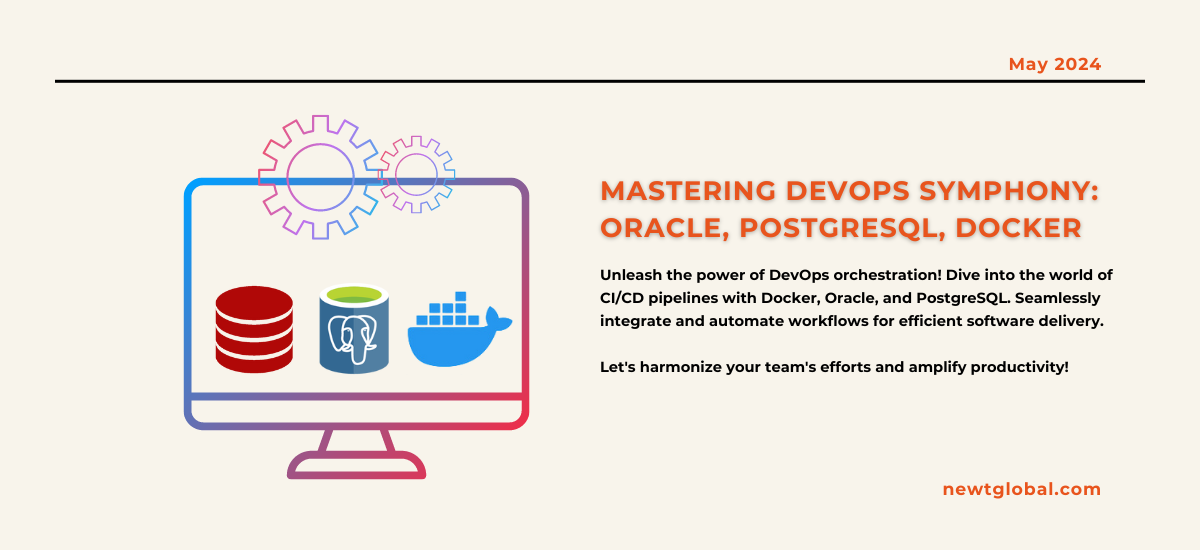
In the world of making software, using DevOps is like finding a hidden level in a video game that gives you amazing new skills. Your work gets faster, more reliable, and you can update your apps quickly. The main engines behind this magic are two tools: Continuous Integration (CI) and Continuous Deployment (CD). These are especially useful when you’re dealing with databases like Oracle and PostgreSQL and using Docker to manage everything. Let’s make these concepts easy to understand and show how you can use them to make your team work like a dream.
Basic Ideas: Docker, Oracle, and PostgreSQL
-
- Docker: Imagine Docker as a special tool that makes software development easier. It helps keep how programs work consistent across different setups. With Docker, teams can package apps and everything they need to run into portable units called containers. This makes it easier to deploy and manage them.
- Oracle and PostgreSQL: Think of Oracle and PostgreSQL as really good at handling data, like experts playing musical instruments. Oracle is often used in big companies because it’s strong and can handle a lot. PostgreSQL, on the other hand, is open-source and great for growing and working with others. Making them part of CI/CD systems needs careful planning to keep everything running smoothly.
- CI/CD Pipelines: These are like a high-tech assembly line for making and delivering software. Every time someone makes changes to the code, this system makes sure those changes are good to go and then automatically updates the app without messing anything up.
Building a Great DevOps Team: Steps for Smooth Integration
Step 1: Setting Up Your Workspace
-
- Docker Installation: Installing Docker is like getting your kitchen ready with the best tools, so you can cook anything you want.
- Database Containers: Setting Up Database Containers with Docker means having Oracle and PostgreSQL ready to use, just like having two chefs who bring their own kitchens. You need to make sure they have everything they need and can work together smoothly.
- Integration Tools: Selecting tools like Jenkins, GitLab CI/CD, or CircleCI is like picking kitchen gadgets that match how you work. The goal is to make the development process smooth from start to finish.
Step 2: Creating CI/CD Pipelines
-
- Continuous Integration (CI): In this phase, every time you change the code, it’s like testing a new recipe. You want to make sure everything is perfect before it goes out. Tools like SonarQube help maintain quality before the code is used.
- Continuous Deployment (CD): Approved changes are sent out automatically, making sure users get the latest features without interruptions.
Step 3: Keeping Things Running Smoothly
-
- Monitoring Tools: Tools like Prometheus and Grafana are your quality control. They keep an eye on how well your app is running and make sure your users are happy.
- Feedback Loops: Feedback Loop mean everyone from the team is encouraged to suggest improvements, making sure you keep getting better at what you do.
Optimizing Performance and Scalability
-
- Docker Compose for Orchestration: This tool helps manage different parts of your setup, making sure everything runs smoothly together.
- Scaling with Kubernetes: For big projects, Kubernetes helps manage databases efficiently, ensuring they can handle a lot of work without crashing.
Becoming a DevOps Expert
By mastering CI/CD pipelines with Docker for Oracle and PostgreSQL, you can make sure everything works together seamlessly. It’s like conducting an orchestra where every part, from the code to the databases, works in harmony. By understanding the technologies, setting up processes carefully, and keeping an eye on performance, your team can create amazing products quickly and efficiently. DevOps is all about learning, innovating, and working together for success.
Ready to elevate your CI/CD game with Oracle, PostgreSQL, and Docker?
Explore the possibilities of seamless integration and orchestration with Newt Global’s DMAP, a cutting-edge solution designed to optimize your DevOps pipelines and database management processes. Unlock the power of automation and scalability while ensuring efficiency and reliability in your deployments.
Learn more about DMAP and its capabilities at newtglobal.com and reach out to us at marketing@newtglobalcorp.com to embark on your journey towards DevOps excellence.
Newt Global DMAP is a world-class product enabling mass migration of Oracle DB to cloud-native PostgreSQL, faster, better, and cheaper.
